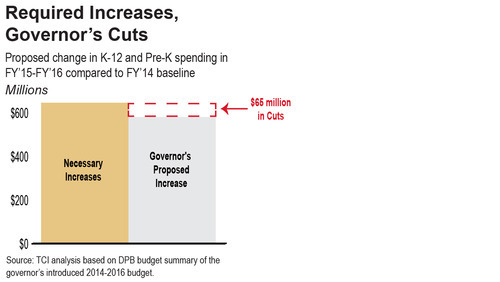December 19, 2013
Governor’s K-12 Funding is Not as it Seems
While the governor claimed his plan would boost K-12 and pre-K education by $583 million, the details tell a different story. The governor toyed with the core education funding formula so that it ignores changes in the cost of “non-personal services” at schools. This means that the state won’t pay for cost increases in things like utilities and textbooks, even though the funding formula is supposed to take account of inflation and enrollment growth to keep state funding per pupil from slipping.
The governor’s budget also cuts salary support for some school employees. The state currently helps school districts in the DC suburbs, where the cost of living is higher than the rest of Virginia, pay for the higher costs of their employees. But the governor took that money out of his budget so that all of the higher costs would fall on already strapped local school districts.
That’s almost $100 million in cuts.
There are some small boosts to particular K-12 programs, plus the budget restores some special funds for school construction that had previously been diverted to backfilling teacher pensions. All told, there’s a net reduction in state resources for education of about $65 million.

But that’s not the whole story. The governor also proposed cutting regular state support for K-12 education by $76 million and replacing those funds with lottery dollars. This would continue the lottery money shell game that Virginia lawmakers have played in recent years. When they were asked to dedicate lottery funds to education back in 2000, Virginians were told that increases in lottery profits would increase school funding. Instead, lawmakers have simply used lottery funds to replace, rather than supplement, state funding.
Keeping up with rising prices, a growing student population and the state’s obligations to retired teachers requires more than $600 million in additional funding over the next two years. But the governor’s budget falls short of that.
When you get past the governor’s talking points, it’s clear that our schools aren’t coming out ahead. They’re not even staying at the status quo. And that’s not something to be proud of.

